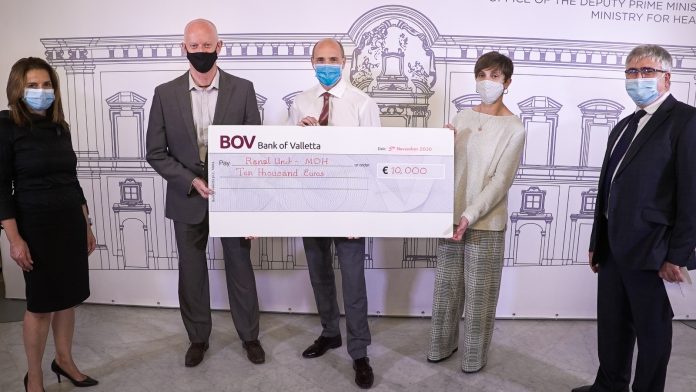Since the introduction of the sophisticated Traccia software solution at Mater Dei Hospital’s Renal Unit in 2017, several patients in Malta had a successful kidney transplant after their blood matching was much more compatible with the donated organ.
At the moment, there are about 320 patients receiving renal replacement therapy at MDH’s Renal Unit, among whom 120 are active on the kidney transplant waiting list.
Traccia data base programme stores all the information regarding the kidney recipient waiting list.
Every patient, active on this list, has their blood tested every four months, to determine any changes in their sera, that might compromise the transplant. It keeps data and give points accordingly to waiting time on dialysis, age matching, human tissue typing (HLA) matching, clinical findings, hypersensitisation, lack of access, and other aspects.
Traccia facilitates the process of finding the right match and compatible with a kidney donor, with better chances of success and longer graft survival and where the recipients can live longer without dilaysis.
Notwithstanding the particular challenges being faced as a result of the pandemic, LifeCycle
(Malta) Foundation is renewing its annual sponsorship agreement for the fourth consecutive year with the Ministry for Health. LifeCycle Founder Alan Curry and LifeCycle Chairperson Dr Shirley Cefai presented the Foundation’s yearly donation of €10,000 to Mater Dei in the presence of the Deputy Prime Minister and Minister for Health Dr Chris Fearne, Mater Dei Hospital CEO Ms Celia Falzon, and Mater Dei Medical Director Mr Walter Busuttil.
The money covers the running costs of mantaining the Traccia data base programme.
Mr Curry said: “For the last 21 years, LifeCycle has raised money and awareness for renal patients in Malta. This year, our Foundation has been badly affected by the pandemic. The proposed annual cycle challenge to Argentina and Chile had to be postponed to October 2021, and therefore our main source of income was lost.
“Yet, like everything in life, there are normally ways in which one can diversify and we did that to be able to meet our commitment to the patients. Traccia software system, which facilitates the matching of blood types used in kidney transplantation, was one of those commitments that we are determined to meet despite the challenging times. The recent launch of LifeWalk, a 100 kilometre walk in four days along the historic Hadrian’s Wall in the UK in April 2021, is an example of our determination and dedication to renal patients and their relatives,” he said.
This is the fourth time LifeCycle is contributing towards Traccia. Their first donation in 2017 amounted to €20,000 with two other subsequent donations of €10,000 each in the following two years. With this year’s donation, LifeCycle has donated €50,000 to the Traccia data base programme in the last four years.
On thanking LifeCycle Foundation for their efforts and support, the Deputy Prime Minister Dr Chris Fearne said: “The Renal Unit at Mater Dei provides modern facilities for treating patients with kidney failure who require haemodialysis and peritoneal dialysis, apart from co-ordinating kidney transplant services. Thanks to the yearly contribution by LifeCycle, the Traccia software programme has been of great support to patients at the Renal Unit. Credit to LifeCycle is even more due this year for their ongoing commitment in their mission of assisting renal patients in Malta, notwithstanding the global pandemic.”
“Renal patients have to undergo four hours on dialysis, three times a week, attached to a blood cleaning machine. This is a very aggressive treatment which leaves the patient quite debilitated.
Rather than relying on the previous approach based on the waiting time on the list, Traccia
facilitates a more scientific, and hence successful approach, as it bases the process on the allocates of organs according to those patients which match most and therefore kidney patients can expect a higher rate of success. Every kidney donation is now being run by this new system and this is saving us precious time,” explained the Renal Unit Charge Head Nurse Paul Calleja.










